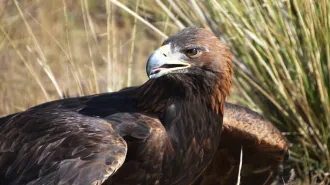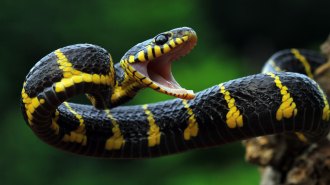Instead of eating fruits and insects as most monkey species do, colobine monkeys in Asia and Africa have a diet more like cows’. They don’t graze on grass, but they do ingest leaves. Two groups of biologists have found that evolution tailored one of the monkeys’ enzymes to this unusual leaf-eating diet.
Similar to cows, colobine monkeys fulfill their nutritional needs in an indirect way. Their diet of leaves lets bacteria thrive in their foregut. Downstream, in their stomach, the monkeys use enzymes called lysozymes to break open these bacteria and employ other enzymes to convert microbial proteins, DNA, and RNA into nutrients.
Monkeys that don’t eat leaves possess a single copy of a particular gene encoding an RNA-degrading enzyme called a ribonuclease. However, Jianzhi Zhang of the University of Michigan in Ann Arbor and his colleagues report that an Asian colobine species has a second copy of this gene. Moreover, it arose during a gene-duplicating event 4 million years ago and seems to have evolved rapidly to the benefit of the monkeys, they say in an upcoming Nature Genetics.
“Apparently, the appearance of this new gene increased the efficiency of digestion,” says Zhang.
When he and his colleagues compared the two ribonuclease genes, they found several differences that change the enzyme’s amino acids. Zhang says that those changes alter the ribonuclease’s electrical charge and therefore its interactions with RNA.
The colobine’s digestive tract is more acidic than that of other primates. In such an acidic environment, the newer enzyme works better than the old one, the researchers discovered. So, Zhang concludes that the animal’s diet created evolutionary pressure that selected for gene mutations that adapted the enzyme’s function to this internal environment.
Caro-Beth Stewart of the State University of New York at Albany notes that colobines are particularly good animals for studying adaptive evolution in molecules. Many years ago, she and her colleagues showed that the lysozymes of colobines and ruminants were so similar in their amino acid sequences that they had probably evolved to perform the same digestive function.
Stewart tells Science News that at an evolution meeting in June 2000, she and her colleague John Schienman described finding in several colobine species the same second ribonuclease gene that Zhang’s team now reports. She and Schienman had also found signs of adaptive evolution in the gene. Stewart says that her group delayed publishing its findings while it accumulated data on the ribonuclease genes of an additional African colobine species, the red colobus.
So far, Zhang and his colleagues have analyzed only a single species of Asian colobine. Zhang intends to investigate a colobine species that doesn’t eat leaves and a non-colobine monkey that eats leaves but not as its sole food.







